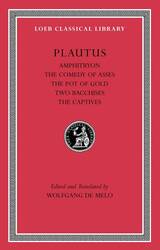
Funny happenings.
The rollicking comedies of Plautus, who brilliantly adapted Greek plays for Roman audiences ca. 205–184 BC, are the earliest Latin works to survive complete and are cornerstones of the European theatrical tradition from Shakespeare and Molière to modern times. This first volume of a new Loeb edition of all twenty-one of Plautus’ extant comedies presents Amphitruo, Asinaria, Aulularia, Bacchides, and Captivi with freshly edited texts, lively modern translations, and ample explanatory notes. Accompanying the plays is a detailed introduction to Plautus’ œuvre as a whole, discussing his techniques of translation and adaptation, his use of Roman humor, stage conventions, language and meter, and his impact on the Greco-Roman comedic theater and beyond.
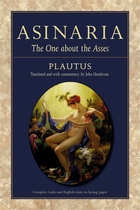
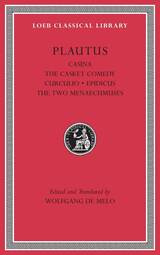
Funny happenings.
The rollicking comedies of Plautus, who brilliantly adapted Greek plays for Roman audiences ca. 205–184 BC, are the earliest Latin works to survive complete and are cornerstones of the European theatrical tradition from Shakespeare and Molière to modern times. This second volume of a new Loeb edition of all twenty-one of Plautus’ extant comedies presents Casina, Cistellaria, Curculio, Epidicus, and Menaechmi with freshly edited texts, lively modern translations, introductions, and ample explanatory notes.
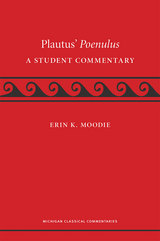
—Radd Ehrman, Kent State University
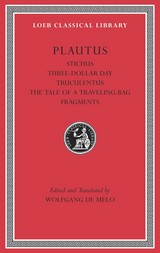
Funny happenings.
The rollicking comedies of Plautus, who brilliantly adapted Greek plays for Roman audiences ca. 205–184 BC, are the earliest Latin works to survive complete and are cornerstones of the European theatrical tradition from Shakespeare and Molière to modern times. This fifth volume of a new Loeb edition of all twenty-one of Plautus’ extant comedies presents Stichus, Three-Dollar Day, Truculentus, The Tale of a Traveling-Bag, and fragments with freshly edited texts, lively modern translations, introductions, and ample explanatory notes.
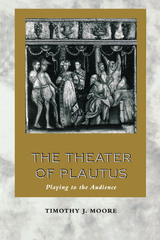
The relationship between actors and spectators has been of perennial interest to playwrights. The Roman playwright Plautus (ca. 200 BCE) was particularly adept at manipulating this relationship. Plautus allowed his actors to acknowledge freely the illusion in which they were taking part, to elicit laughter through humorous asides and monologues, and simultaneously to flatter and tease the spectators.
These metatheatrical techniques are the focus of Timothy J. Moore's innovative study of the comedies of Plautus. The first part of the book examines Plautus' techniques in detail, while the second part explores how he used them in the plays Pseudolus, Amphitruo, Curculio, Truculentus, Casina, and Captivi. Moore shows that Plautus employed these dramatic devices not only to entertain his audience but also to satirize aspects of Roman society, such as shady business practices and extravagant spending on prostitutes, and to challenge his spectators' preconceptions about such issues as marriage and slavery. These findings forge new links between Roman comedy and the social and historical context of its performance.
READERS
Browse our collection.
PUBLISHERS
See BiblioVault's publisher services.
STUDENT SERVICES
Files for college accessibility offices.
UChicago Accessibility Resources
home | accessibility | search | about | contact us
BiblioVault ® 2001 - 2024
The University of Chicago Press









